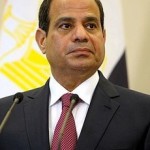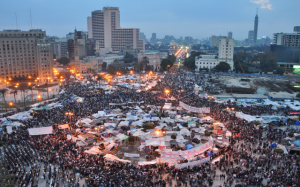
Earlier this year we wrote about the hope that Egyptian President Abdel Fattah al-Sisi may be a man of peace. That idea was based on a couple of historical developments:
- On New Year’s Day 2015, Sisi spoke at Al-Azhar University in Cairo, considered the world’s leading center for Islamic studies. He was addressing religious scholars celebrating the birthday of the prophet Mohammed. His words were a rousing call for the reformation of Islam. (For example, “It’s inconceivable that the thinking that we hold most sacred should cause the entire Islamic world to be a source of anxiety, danger, killing, and destruction for the rest of the world.”)
- Then on January 8th, Christmas Day in the Coptic Church, Sisi made a surprise visit to St. Mark’s Coptic Orthodox Cathedral—the seat of the Coptic Orthodox Pope. Before the church and its pope, Tawadros II, Sisi brought greetings during the Christmas Eve Mass. This act was unprecedented in modern Egyptian history.
Now it appears President Sisi is following his words with deeds. On April 22, Jamie Dettmer wrote an article for Voice of America titled “Egypt Reforms School Textbooks to Counter Extremism.”
Egypt’s Ministry of Education is removing from primary and secondary school curricula some religious texts and passages on historical Islamic figures including Saladin, the 12th century Muslim ruler who confronted the Crusaders and is widely viewed as an iconic hero in the Arab world.
The changes to primary and secondary school curricula, being touted by government ministers as a bid to counter radical Islamic ideologies, is provoking the ire of Islamists in the country … .
But the country’s education ministry says, “Some of the material was inciting violence and was first entered into the curriculum during the Muslim Brotherhood’s era.” Officials say the censoring of material used to encourage violence is part of a larger ideological battle the government is determined to wage against Islamic extremism.

Four-and-one-half years ago, some young Egyptians initiated the Egyptian version of the Arab Spring in Cairo’s Tahrir Square. They were a new generation of youth who longed for freedom, longed to express themselves openly. Their cry for freedom did not turn out as they had hoped; it was hijacked by the militant Muslim Brotherhood. But perhaps President Sisi and his Cabinet leaders will succeed where the students failed. Perhaps these changes will lead to a more liberal and pluralistic society.
Let us pray for Egypt, for President Sisi, and for the men and women of that nation who long to live free.
- Darrow Miller
Related posts:
Can A Military Dictator Be A Man of Peace?
Culture and Religion: Can a Christian Worship Jesus in the Mosque?





